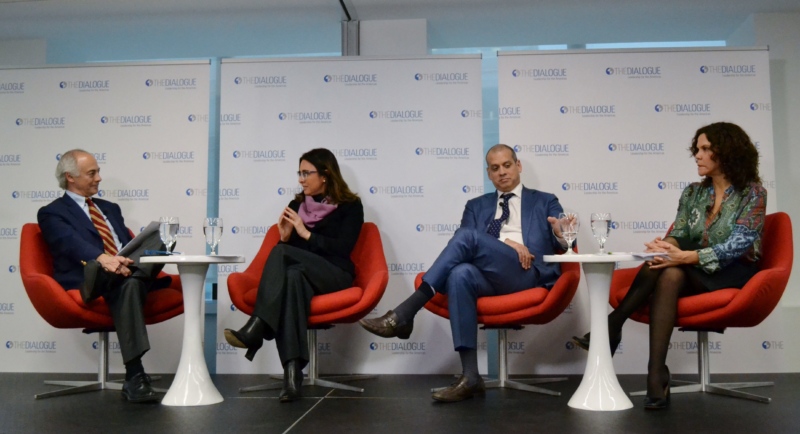The Washington Post & the OAS Secretary General
The OAS needs to be reformed, but the changes need to emerge from accurate analysis of the problems confronting both Latin America and the OAS.
On February 22, the Inter-American Dialogue in partnership with Reporters Without Borders, the Faculty of Law at the Universidad de los Andes, and NTN24 hosted an event titled “Is Fake News a Real Problem in Latin America?” This discussion, moderated by Juan Carlos Iragorri from NTN24, featured Catalina Botero (Universidad de los Andes), Claudia Trevisan (O Estado de S. Paolo), and Daniel Sepulveda (US Department of State, retired). The conversation focused on the implications of fake news on the region’s upcoming elections and long-term impacts on its democracies.
Michael Camilleri from the Dialogue offered opening remarks. While fake news has been an issue at the forefront of political discourse in the United States, it is also a challenge affecting countries such as Brazil and Mexico. Although the public knows that “fake news” exists, defining it has further become a “source of confusion and controversy.” Iragorri, the moderator, added that fake news is nothing new but rather a common historical experience. Who needs to take responsibility? What are its implications for our democracies?
The panelists each offered their definition on “fake news” and the context within their respective countries:
Trevisan, a Brazilian reporter, contended that Brazilians are susceptible to “fake news” because they are avid consumers of social media, including platforms such as WhatsApp. This type of disinformation campaign is being used to target individuals such as former President Lula, current President Temer, and federal judge Sergio Moro. Current presidential candidate Bolsonaro is instead benefitting from the positive effects of “fake news.” The targets of "fake news" also include traditional journalism and polling agencies.
Botero, a Colombian law professor, defined its motivations and goals by providing the Colombian context. There are political and economic incentives to generate it. “In Colombia, there is 'fake news' to turn lies into truths and there is 'fake news' to generate uncertainty and mistrust.” This can consequently erode trust in democratic institutions and political elites. She cited the peace accords plebiscite as an example of how it can be successful.
“We need to have a serious debate about what solutions look like,” but any proposal “can have almost as many negative consequences as positive ones.” -@DSepDC #FakeNewsLatAm
— The Inter-American Dialogue (@The_Dialogue) February 22, 2018
Watch live: https://t.co/YD8ZZNLT3p pic.twitter.com/mfTHH28OU3
Sepulveda, a former State Department communications official, commented on the American experience. He acknowledged that there is proven evidence from the US intelligence community that Russians embarked on a misinformation campaign to mislead the American public during the 2016 general election. Unlike Colombia or Brazil, this is a case where a state actor was behind efforts to generate “fake news.” “Fake news” did not influence the outcome. But, it achieved in generating uncertainty and mistrust among the American public.
The panelists then commented on whether governments, the press, and the public could respond to this challenge. Trevisan and Botero expressed deep concerns over any government involvement in legislating against “fake news.” For example, the Brazilian government has attempted to enact legislation that would prosecute those guilty of creating and disseminating it. Botero worried that efforts like these could easily be used by the state to suppress dissidents who express anti-government views.
Alternatively, Sepulveda suggested that governments could collaborate with tech companies in Silicon Valley to produce tools to identify and screen "fake news". These firms are faced with this burden because of their monopoly on social media platforms. They have started developing technical solutions to screen “fake news,” but they could also invest in more human capital to screen for it. This also inevitably leads to the concern of bias when deciding what is real or fake. Traditional media, non-governmental organizations, or academics could contribute to fact-checking in this space.
The free press faces the greatest challenges in addressing “fake news.” Its prominence and prestige have been severely damaged by misinformation and politicians. Botero argued that journalists should not let themselves get carried away by the excesses of social media. Instead, they should establish fact-checking processes and demonstrate better journalistic practices.
Sepulveda also deliberated to what extent educating the public on digital literacy helps. The panelists recognized that everyone has an individual responsibility to acknowledge their own biases when consuming information. “Fake news” has effectively tapped into democracy’s greatest weakness as a pluralistic society with inherent divisions. Therefore, it is the citizens’ responsibility to protect the freedom of the press and overcome these divisions. The reality is that there is no “silver bullet solution.”
Sepulveda warned the audience of romanticizing the internet and its technological advances as a boon to democracy. It is a tool which can be used to do well or harm. Most importantly, we must understand that “fake news is neither from the left or right; it is anti-democratic.”
The OAS needs to be reformed, but the changes need to emerge from accurate analysis of the problems confronting both Latin America and the OAS.
Although politics has cyclical features, and ideology is sometimes a factor in choices made by Latin American voters, the left-right labels obscure more than they illuminate.
Peruvians want an evolution, not a revolution.
 Ben Raderstorf / Inter-American Dialogue
Ben Raderstorf / Inter-American Dialogue